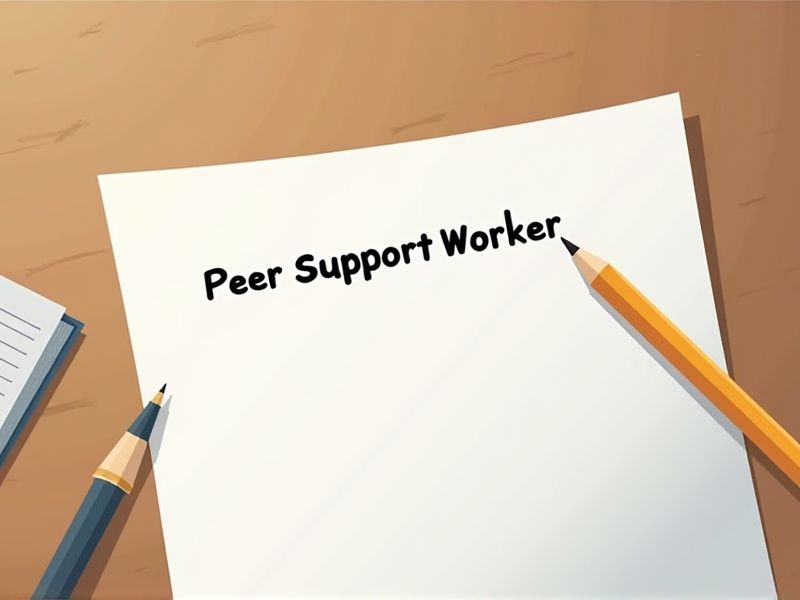
Peer Support Workers play a crucial role in providing emotional and practical support to individuals experiencing similar challenges. The need for specific certifications arises from the necessity to ensure that workers have the appropriate skills to handle sensitive situations and maintain professional boundaries. Certifications also help establish credibility and trust with the people they support and within the professional community. Here are some key certifications often required for Peer Support Workers.
Certified Peer Support Specialist (CPSS)
The presence of a Certified Peer Support Specialist (CPSS) ensures that peer support workers operate with a solid foundation of ethical guidelines and professional standards. Training and certification as a CPSS increase credibility and trustworthiness among clients and mental health teams, reinforcing the effectiveness of peer support programs. Evidence-based studies show that CPSS-led interventions often result in improved client outcomes, such as reduced hospitalization rates and increased engagement in recovery. The structured framework and continuous education associated with certification help maintain consistency and quality in peer support services.
Certified Recovery Peer Specialist (CRPS)
The presence of a Certified Recovery Peer Specialist (CRPS) enhances the credibility and trust between the peer and the individual seeking recovery, facilitating more effective support. A CRPS is equipped with specialized training that allows them to utilize lived experiences in a structured manner, providing guidance grounded in real-world understanding. Certification ensures that peer support workers adhere to ethical standards and best practices, reducing the risk of harm to those they assist. With the formal backing of a CRPS, peer support programs often experience improved outcomes, such as higher rates of sustained recovery and client engagement.
Mental Health First Aid Certification
Mental Health First Aid Certification provides peer support workers with essential skills to recognize and respond to signs of mental health issues, enhancing their ability to support others effectively. This certification equips them with evidence-based strategies for crisis intervention, which can reduce the risk of harm in critical situations. By understanding mental health challenges more deeply, peer support workers can build trust and empathy with those they assist. Formal certification strengthens the credibility and professionalism of peer support workers, promoting a more standardized approach to mental health care.
Crisis Prevention Intervention (CPI) Training
Crisis Prevention Intervention (CPI) Training equips peer support workers with essential skills to manage and de-escalate potentially volatile situations, enhancing safety for both workers and clients. The training fosters effective communication and conflict resolution techniques, enabling workers to support individuals more empathetically and efficiently. Through CPI Training, peer support workers gain an understanding of recognizing early warning signs of a crisis, allowing for timely and appropriate intervention. The knowledge obtained reduces the risk of harm and builds a more trusting environment between peers and support workers.
Suicide Prevention Training (e.g., ASIST)
Suicide prevention training equips peer support workers with crucial skills to recognize warning signs in individuals contemplating self-harm. This knowledge enables timely intervention, potentially reducing the risk of suicide among those they support. Comprehensive training programs like ASIST enhance the confidence and effectiveness of peer support workers in critical situations. Incorporating these skills into their practice fosters a safer environment for communication and healing.
Trauma-Informed Care Certification
Trauma-informed care certification equips peer support workers with the knowledge to recognize the signs of trauma, which is vital in promoting a supportive environment. Understanding trauma's impact ensures that workers can facilitate healing without retraumatizing clients. Certification provides a standardized framework that enhances trust and credibility between workers and those they assist. Training in this area promotes a culture of safety and empowerment, essential for effective peer support services.
Certified Addiction Recovery Coach
Certified Addiction Recovery Coaches possess specialized training that enhances their ability to guide individuals through the recovery process effectively. Peer Support Workers benefit from the structured strategies and frameworks these coaches provide, which improve intervention outcomes. The certification ensures a standardized approach in handling complex recovery scenarios, reducing the risk of relapse. Clients often feel more secure and motivated when supported by someone with recognized credentials, which promotes long-term recovery success.
Certified Crisis Intervention Specialist
The integration of Certified Crisis Intervention Specialists into peer support work enhances the capability to manage intense emotional situations, fostering a safer environment for both peers and workers. With specialized training, these specialists can de-escalate volatile interactions, reducing the immediate risk of harm and promoting mental stability. They provide evidence-based techniques that empower peer support workers to handle crises effectively, ensuring higher quality care. Certification also increases credibility and trust among clients, which can enhance the overall effectiveness of peer support programs.
Peer Wellness Specialist Certification
Peer Wellness Specialist Certification ensures that Peer Support Workers have formalized training, fostering consistency and credibility in their support roles. Such certification enhances the ability of workers to effectively address mental health challenges and substance use issues, providing a structured approach to recovery. It serves as a validation of lived experiences, empowering workers to connect genuinely with those they support. The certification also facilitates access to employment opportunities within mental health services, improving career prospects for individuals in this field.
Cultural Competency in Behavioral Health Certification
Cultural competency in behavioral health certification equips peer support workers with the necessary skills to understand and respect diverse cultural backgrounds, directly affecting their ability to build trust and effective communication with clients. An understanding of cultural nuances can lead to more accurate assessments and tailored interventions, improving the outcomes for individuals from varied cultural contexts. The certification provides peer support workers with tools to recognize and address potential cultural biases, reducing the likelihood of misunderstandings and conflicts. As diverse populations continue to grow, culturally competent peer support becomes a crucial factor in delivering inclusive and equitable behavioral health services.
Summary
You gain enhanced credibility and trust from clients when Peer Support Workers have certifications. This validation of skills often leads to increased job opportunities and advancement. Clients and organizations generally experience improved service quality and satisfaction. The certification process typically results in a stronger professional network for peer workers.
